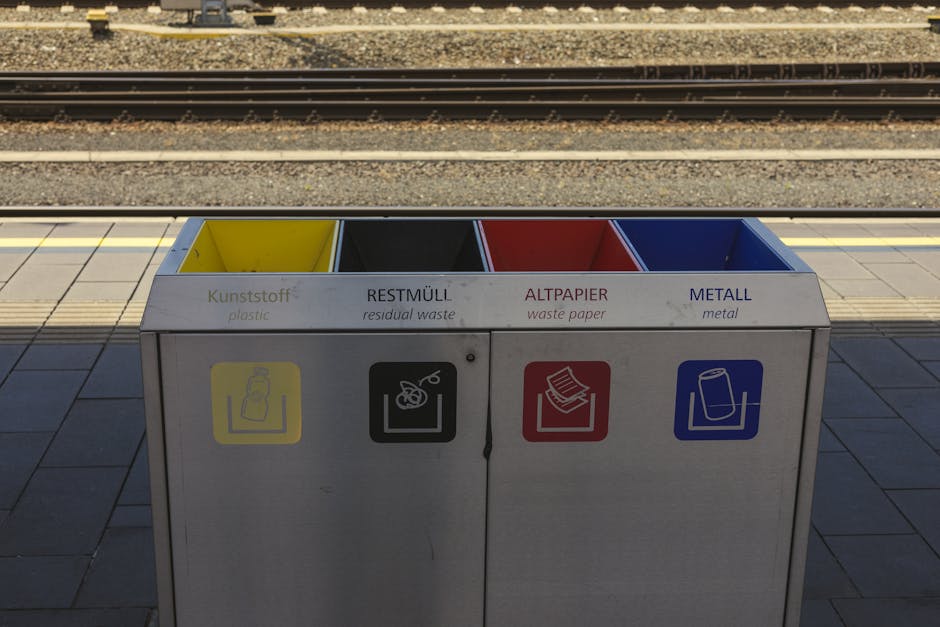
In recent years, Germany has become a global leader in efficient waste management and recycling practices. As we approach 2025, these practices continue to evolve, reflecting the country’s commitment to environmental sustainability and innovation. This guide aims to provide international readers, particularly those in the United States and Europe, with a comprehensive overview of waste management and recycling practices in Germany. By understanding these systems, we can draw insights and inspiration for adopting similar measures in our respective regions.
The Foundation of Germany’s Waste Management System
Germany’s approach to waste management is built on a well-structured framework that emphasizes reduction, reuse, and recycling—commonly known as the “3 Rs”. The country’s policies are rooted in the Circular Economy Act (Kreislaufwirtschaftsgesetz), which aims to minimize waste production and maximize resource efficiency.
Key Elements of the Waste Management System
- Waste Hierarchy: Germany prioritizes waste prevention, followed by preparing for reuse, recycling, other recovery methods (such as energy recovery), and lastly, disposal.
- Producer Responsibility: Manufacturers are obligated to take responsibility for the lifecycle of their products, including end-of-life disposal and recycling.
- Waste Separation: Stringent regulations ensure that waste is meticulously sorted into categories, including paper, glass, plastics, metals, and organic waste.
- Public Participation: Citizens are actively engaged in recycling through educational programs and incentives, fostering a culture of environmental responsibility.
Recycling Categories and Processes
In Germany, waste is sorted into specific categories to facilitate effective recycling. Understanding these categories can help individuals and businesses align with best practices.
Paper and Cardboard
Recycling paper and cardboard is crucial in reducing deforestation and conserving energy. In Germany, paper waste is collected separately in blue bins or containers. It is essential to ensure that the paper is clean and dry to maintain its recyclability. Common items include newspapers, magazines, and packaging materials.
Glass
Glass recycling in Germany requires sorting by color—clear, green, and brown—before disposal in designated containers. This practice ensures high-quality recycling and resource recovery. Remember to remove lids and caps before recycling bottles and jars.
Plastics and Metals
Plastics and metals are collected in yellow bins or bags, known as the “Gelber Sack.” This category includes items like plastic bottles, aluminum cans, and other packaging materials. Sorting facilities then separate these materials for further processing.
Organic Waste
Organic waste, including food scraps and garden waste, is collected in brown bins. This waste is composted or used in biogas plants to generate energy, thus contributing to renewable energy production.
Advanced Recycling Technologies
By 2025, Germany has integrated cutting-edge technologies in its recycling infrastructure to enhance efficiency and sustainability. These innovations include:
- Automated Sorting Systems: Advanced optical and -driven technologies are used in sorting facilities to accurately identify and separate materials.
- Smart Bins: Equipped with sensors, these bins monitor waste levels and optimize collection routes, reducing emissions and operational costs.
- Digital Platforms: Online tools and apps provide real-time information on recycling guidelines, collection schedules, and nearby recycling centers.
Waste Management Regulations and Compliance
Germany’s stringent waste management regulations ensure compliance and promote environmental stewardship. By adhering to these regulations, residents and businesses play a critical role in maintaining an effective recycling ecosystem.
Packaging Act (Verpackungsgesetz)
Implemented to reduce packaging waste, this act mandates that producers are responsible for the collection and recycling of packaging materials. It encourages eco-friendly packaging design and material selection.
Deposit Return System
Germany operates a highly successful deposit return system for beverage containers. Consumers pay a deposit when purchasing beverages and receive a refund upon returning the empty containers for recycling.
Penalties for Non-Compliance
Failure to adhere to waste management regulations can result in penalties, including fines and stricter enforcement measures. These penalties underscore the importance of following established guidelines and fostering a culture of compliance.
Educational Initiatives and Community Engagement
Germany places a strong emphasis on education and community engagement in promoting sustainable waste management practices. Various initiatives are designed to inform and empower citizens:
- School Programs: Schools integrate waste management education into their curricula, instilling environmental values in students from a young age.
- Public Awareness Campaigns: Nationwide campaigns raise awareness about the importance of recycling and proper waste disposal.
- Community Events: Local clean-up drives and recycling workshops encourage active community participation and environmental stewardship.
Challenges and Future Directions
Despite its successes, Germany’s waste management system faces ongoing challenges, including handling complex waste streams and adapting to changing consumption patterns. The future of waste management in Germany lies in continued innovation, increased public participation, and international collaboration.
Emerging Trends
- Zero Waste Initiatives: Efforts to minimize waste generation and promote a circular economy are gaining traction, with a focus on reducing single-use plastics and promoting reusable alternatives.
- Cross-Border Collaboration: Germany actively engages in international partnerships to share knowledge and develop solutions for global waste management challenges.
FAQ
What is the role of citizens in Germany’s waste management system? Citizens play a crucial role by separating waste correctly, participating in recycling programs, and adhering to regulations. Public education campaigns and incentives motivate individuals to contribute actively to waste reduction efforts.
How does the deposit return system work in Germany? The system involves paying a refundable deposit on beverage containers, which is returned to consumers when they recycle the containers. This incentivizes recycling and reduces littering.
What happens to non-recyclable waste in Germany? Non-recyclable waste is typically sent to waste-to-energy facilities, where it is incinerated to generate electricity and heat, minimizing landfill use and contributing to sustainable energy production.
How does Germany ensure compliance with its waste management regulations? Compliance is ensured through regular inspections, fines for violations, and public awareness campaigns that educate citizens and businesses about their responsibilities.
What can other countries learn from Germany’s waste management practices? Other countries can learn the importance of a robust regulatory framework, public engagement in waste separation and recycling, and the integration of advanced technologies to enhance waste management efficiency.
Conclusion
Germany’s waste management system serves as a model for efficient recycling practices and environmental stewardship. As we move towards 2025, the country’s commitment to innovation, education, and collaboration will continue to pave the way for sustainable waste management. By adopting similar practices, other nations can contribute to a cleaner, greener future.


